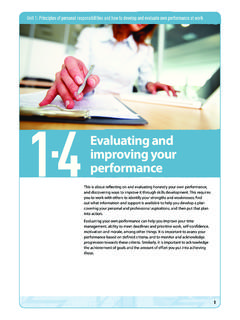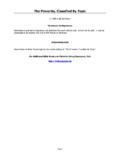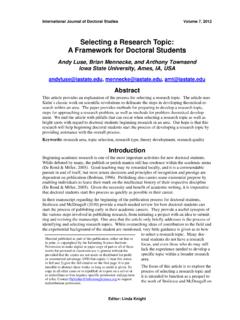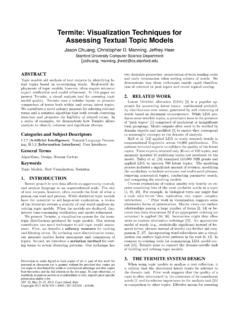Transcription of Topic guide 13.3: Creating mutual trust and respect
1 Unit 13: Develop working relationships with colleagues and stakeholders . 133 Creating mutual trust and respect Organisations that thrive are those where the company culture promotes mutual trust and respect of colleagues, and this is as true in PR as it is elsewhere. In this unit we will examine how you can create and maintain mutual trust and respect with your colleagues and external stakeholders. In the workplace you may be required to work with stakeholders, both internally and externally, whom you do not personally like. By working through this unit you will be able to see how acting in a professional manner at all times means that you are able to show trust and respect to stakeholders and build positive working relationships in the absence of an emotional connection.
2 1. Unit 13: Develop working relationships with colleagues and stakeholders 1 Building trust with stakeholders and colleagues Character traits Whether building trust with internal or external stakeholders, you need to exhibit the same qualities of professional conduct. These include: integrity are you always honest in your dealings with others? credibility can you be trusted to have the knowledge to back up your honesty, is what you are saying or proposing credible? accountability are you always ready to take responsibility for your actions? reliability can you be depended on to deliver what you have promised?
3 Transparency are you always clear about what you say and are your professional workings always simple to understand? courtesy do you always have the manners to listen to other people's points of view, and remember to thank them for their input? By exhibiting these character traits you will earn the respect of your colleagues and other professionals you come into contact with. Link Codes of conduct You can find more about codes of conduct and ethics in Unit 2: PR professionals have in the past been accused, perhaps unfairly, of not exhibiting Understanding public relations. the traits mentioned above.
4 The CIPR (Chartered Institute of Public Relations) and other professional bodies have now included these traits in their codes of conduct. In your organisation there may be other codes of conduct; these might be Activity found within your contract. Often these codes include things such as client Look at your contract, or ask confidentiality and relate to how you need to keep client campaigns and your line manager if there are communication confidential unless specified otherwise. Many internal codes any internal codes of conduct in of conduct will also list things such as the need to be on time to work, how to your workplace.
5 Conduct interactions with colleagues and clients, and what personal conduct is and is not permitted within office hours for example, making personal calls. Creating an environment of trust with colleagues Colleagues working closely together often form impressions based on what they see, so actions are important to building trust and respect within the team. Look at Figure to see how you can create a positive impression. Figure : Actions that Deliver quality build trust and respect work on time and Listen Seek to understand on budget others Actions Acknowledge and Keep promises Show improvement correct errors : Creating mutual trust and respect 2.
6 Unit 13: Develop working relationships with colleagues and stakeholders Building trust and respect Creating an environment of trust with your colleagues involves a much more personal level than previously discussed but the underlying concepts are the same. In order for you to build good relationships with your colleagues and earn their trust , you must monitor your working practices and behaviours, and ensure that you do the following. Always communicate information clearly and consistently in a timely manner when asked for it. At the beginning of your career especially, you will be a junior member of a larger team and other members in the team will be relying on you to complete your work so that they can complete theirs.
7 Work together with other members of your team to support the whole team in the completion of a task. You can do this in both a reactive manner (by completing team tasks when requested to do so), but you should also look to do this in a proactive manner (by actively seeking out opportunities to help and assist others). Ask questions if you are unsure of the outcome you are trying to achieve. It is not a sign of a weakness to ask questions. Colleagues and line managers will be more likely in the long term to trust someone who looked for clarification of a point in order to complete their work to the best of their ability.
8 When asking questions, ensure that they are open questions, enabling long, full responses, rather than closed questions, which allow only yes or no answers. Clearly agree to what is asked of you, showing understanding and that you were listening. Hold yourself to account to ensure you complete your task. Say no to things that you know you are unable to do. It is tempting to say yes in an attempt to appear helpful and professional whenever anyone asks you to do something. While it is good to have a can-do attitude, if you are unable to complete requests because of lack of knowledge or skills, people will be less likely to trust you with other tasks.
9 Tell colleagues promptly if you are unable to complete assigned tasks in a timely manner or if you will be unable to fulfil agreements made. Consider the impact of your behaviour and actions on others. This can range from the basic professionalism of showing up to work on time and staying late at work to complete a task for a deadline, to the way that you speak to other people. Have empathy for others try to put yourself in another person's position and see their point of view. Show respect for others' opinions and roles within the team. While it is acceptable to disagree with someone's point of view, it is important to listen fully to their view point and assess if your view is relevant to the discussion at hand.
10 If it is, you should put it forward without dismissing the other person's viewpoint. All opinions should be respected until a way forward is found;. at that point you must accept and respect the consensus opinion. It is also important to respect people's individuality and be tactful. People may have different cultural and educational backgrounds from your own, and you must respect their views. Keep promises and honour commitments. By following the above guidelines, you will build better long-term business relationships and earn the respect and trust of your colleagues. : Creating mutual trust and respect 3.














